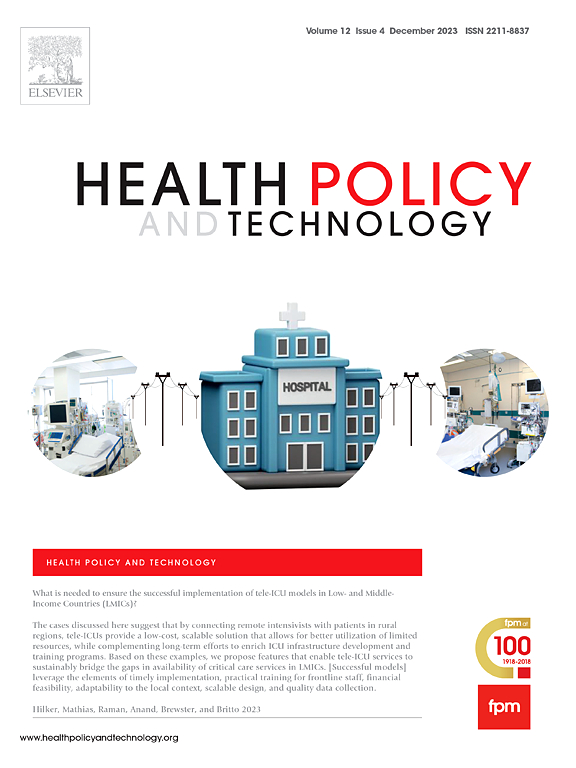Reflecting on relaxing zero-COVID and moving forward with positivity: A population-based quantitative and qualitative study
IF 3.4
3区 医学
Q1 HEALTH POLICY & SERVICES
引用次数: 0
Abstract
Objectives
The event that China lifted its zero-COVID policy in December 2022 promoted this study to investigate people's responses in terms of health, mood, life satisfaction, and policy satisfaction following the policy relaxation.
Methods
We conducted a cross-sectional online survey one month after relaxing zero-COVID policy among Chinese general population using qualitative and quantitative approaches. Participants rated their health, mood, life satisfaction, and policy satisfaction on a horizontal visual analogue scale ranging from 1 to 100. In addition, we included open-ended questions to gain deeper insights into their responses.
Results
Out of 4456 participants, approximately 70 % reported satisfaction following the policy change. Those with recent COVID-19 infection (N = 3308) rated lower scores in health, mood, life satisfaction, and policy satisfaction than those without recent infection. A multiple linear regression model revealed that the absence of recent COVID-19 infection, higher life satisfaction, and greater policy satisfaction were associated with better mood. Interestingly, participants who experienced increases in life and policy satisfaction also had better moods. Qualitative analysis revealed an improved mood of participants, reflecting a desire to return to normal life despite a preference for a gradual and well-prepared transition policy.
Conclusions
This study highlighted positive changes following the relaxation of zero-COVID policy. Strategies aiming at post-COVID-19 recovery should prioritize individuals who have contracted the virus while promoting life and policy satisfaction amongst the general population.
Public Interest Summary
China's decision to lift its dynamic zero-COVID policy on December 7, 2022, marked a significant shift in COVID-19 control measures, ushering in immediate stressors and challenges. Our study, employing both quantitative and qualitative methods, sought to understand how the general population in China responded to this transition. We found that participants reported above-average levels of self-assessment health, mood, life satisfaction, and policy satisfaction following the relaxation of the zero-COVID policy. Notably, those with recent COVID-19 infection reported lower satisfaction levels than those without recent infection. Moreover, the absence of recent COVID-19 infection, higher life satisfaction, and greater policy satisfaction were associated with better mood outcomes. In addition, we observed a positive synergistic effect between life satisfaction and policy satisfaction on mood. Despite a preference for a gradual and well-prepared transition policy, participants showed improved mood, reflecting an inclination towards a return to normalcy. Our study captured this pivotal moment of policy change, revealing positive changes to move forward amid complex responses.
反思零 COVID,积极向前:基于人群的定量和定性研究
方法 我们采用定性和定量相结合的方法,在中国零加价政策放宽一个月后对中国普通人群进行了横断面在线调查。受访者用 1 到 100 分的横向视觉模拟量表对自己的健康、情绪、生活满意度和政策满意度进行评分。结果在 4456 名参与者中,约 70% 的人对政策变化表示满意。与近期未感染 COVID-19 的参与者相比,近期感染 COVID-19 的参与者(N = 3308)在健康、情绪、生活满意度和政策满意度方面的评分较低。多元线性回归模型显示,近期未感染 COVID-19、较高的生活满意度和较高的政策满意度与较好的情绪有关。有趣的是,生活满意度和政策满意度提高的参与者也有更好的情绪。定性分析显示,参与者的情绪有所改善,这反映出他们希望恢复正常生活,尽管他们更倾向于采取循序渐进、准备充分的过渡政策。公益摘要中国决定于 2022 年 12 月 7 日取消动态的零感染 COVID 政策,这标志着 COVID-19 防控措施的重大转变,同时也带来了直接的压力和挑战。我们的研究采用定量和定性方法,试图了解中国普通民众如何应对这一转变。我们发现,零 COVID 政策放宽后,参与者的自我健康评估、情绪、生活满意度和政策满意度均高于平均水平。值得注意的是,与近期未感染 COVID-19 的参与者相比,近期感染 COVID-19 的参与者的满意度较低。此外,近期未感染 COVID-19、较高的生活满意度和较高的政策满意度与较好的情绪结果相关。此外,我们还观察到生活满意度和政策满意度对情绪有积极的协同作用。尽管参与者更倾向于循序渐进、准备充分的过渡政策,但他们的情绪还是得到了改善,这反映出他们倾向于恢复正常生活。我们的研究捕捉到了政策变化的这一关键时刻,揭示了在复杂反应中向前迈进的积极变化。
本文章由计算机程序翻译,如有差异,请以英文原文为准。
求助全文
约1分钟内获得全文
求助全文
来源期刊

Health Policy and Technology
Medicine-Health Policy
CiteScore
9.20
自引率
3.30%
发文量
78
审稿时长
88 days
期刊介绍:
Health Policy and Technology (HPT), is the official journal of the Fellowship of Postgraduate Medicine (FPM), a cross-disciplinary journal, which focuses on past, present and future health policy and the role of technology in clinical and non-clinical national and international health environments.
HPT provides a further excellent way for the FPM to continue to make important national and international contributions to development of policy and practice within medicine and related disciplines. The aim of HPT is to publish relevant, timely and accessible articles and commentaries to support policy-makers, health professionals, health technology providers, patient groups and academia interested in health policy and technology.
Topics covered by HPT will include:
- Health technology, including drug discovery, diagnostics, medicines, devices, therapeutic delivery and eHealth systems
- Cross-national comparisons on health policy using evidence-based approaches
- National studies on health policy to determine the outcomes of technology-driven initiatives
- Cross-border eHealth including health tourism
- The digital divide in mobility, access and affordability of healthcare
- Health technology assessment (HTA) methods and tools for evaluating the effectiveness of clinical and non-clinical health technologies
- Health and eHealth indicators and benchmarks (measure/metrics) for understanding the adoption and diffusion of health technologies
- Health and eHealth models and frameworks to support policy-makers and other stakeholders in decision-making
- Stakeholder engagement with health technologies (clinical and patient/citizen buy-in)
- Regulation and health economics
 求助内容:
求助内容: 应助结果提醒方式:
应助结果提醒方式:


